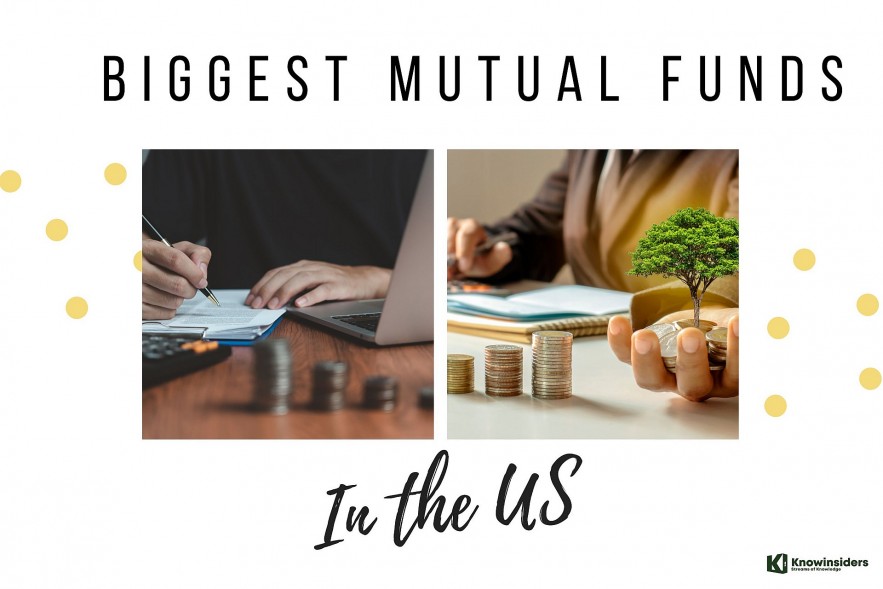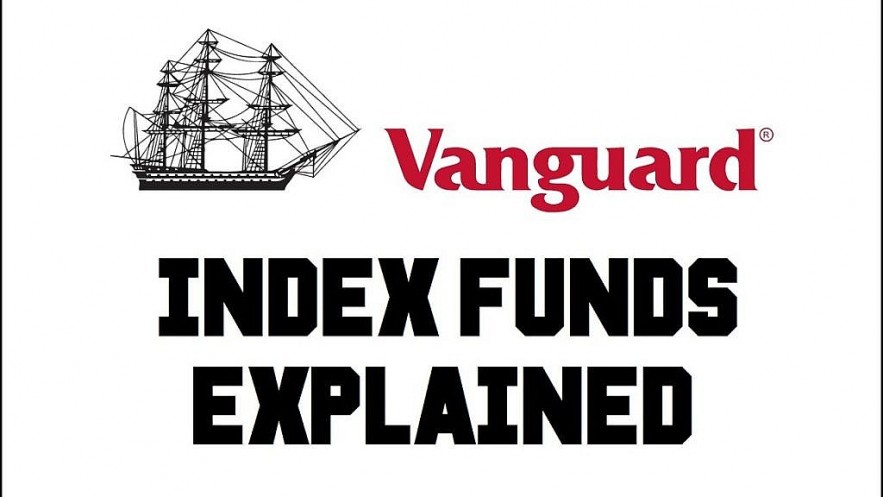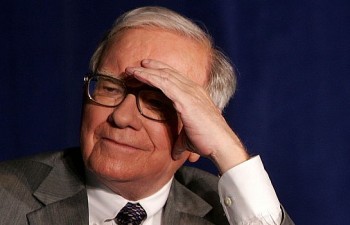Top 10 Biggest Mutual Funds in the US Today
| Table of Contents |
Many new and relatively-inexperienced investors are always on the lookout for the best mutual funds to invest in. They seek advice from their friends, colleagues, or online forums dedicated to mutual funds when they begin their investment journey or when they have extra money to invest. However, many individuals find themselves dissatisfied with the responses they receive from the internet or their peers for a variety of reasons.
When conducting an online search, you will likely come across various websites that offer pre-compiled lists. Check out top 10 biggest and most prestigious mutual funds in the US in the following article.
Learn more: Top 9 Biggest Hedge Funds in the US Today
 |
| Top 10 Biggest Mutual Funds In The US |
What is a Mutual Fund?
Investors pool their money together in mutual funds to purchase a diverse range of investments. Experienced managers make the decisions on which investments to purchase and sell for the fund. An experienced fund manager oversees the diverse range of investments, with the fund's assets and objectives clearly outlined in its prospectus.
A mutual fund is a collection of stocks, bonds, or other securities that are bought using the combined capital of investors.
Individual investors can gain access to diversified, professionally managed portfolios through mutual funds.
There are various factors that distinguish mutual funds from one another, such as the types of securities they choose to invest in, their specific investment goals, and the returns they aim to achieve.
Mutual funds charge annual fees, expense ratios, or commissions, which lower overall returns.
A large number of American workers choose to invest their retirement funds in mutual funds through employer-sponsored retirement plans.
Understanding the Calculation of Earnings in Mutual Funds
Investors generally receive returns from a mutual fund through three different methods:
Income from dividends and interest: Mutual funds distribute the income generated from stocks and bonds held in their portfolio. Investors in funds are typically offered the option to either receive a check for their earnings or reinvest them to acquire more shares in the mutual fund.
Portfolio distributions: When the fund decides to sell securities that have experienced price increases, it results in a capital gain. Typically, most funds also distribute this gain to their investors.
Profit potential: If the value of the fund's shares rises, you have the opportunity to sell your mutual fund shares at a higher price in the market.
Is it wise to consider investing in the largest mutual funds?
The largest exchange-traded funds (ETFs) in the world manage a smaller amount of money than the largest mutual funds. However, their size alone does not guarantee them as a top investment. The Vanguard Total Bond Market II Index has only managed to achieve a modest annual return of just over 1 percent for the past ten years, which is significantly lower than the returns of certain stock funds. It's possible to discover more favorable returns through investing in top-performing mutual funds or ETFs.
Furthermore, it is worth noting that mutual funds of significant size tend to allocate their investments towards prominent companies, such as those included in the Magnificent 7 stocks. However, it is important to consider that there are potential opportunities for attractive returns beyond this particular sector. For instance, it might be wise to seek out funds that focus on smaller companies with the potential for impressive returns, like the top-performing small-cap ETFs. These smaller companies have the potential to outperform when the larger companies are not favored, providing you with the advantage of diversification.
Therefore, the fact that these funds are the largest does not necessarily mean they should be purchased right away. However, it may be worthwhile to delve deeper into funds that track indexes known for their strong historical performance, such as the S&P 500 or Nasdaq. Interestingly, renowned investor Warren Buffett has suggested that individual investors consider purchasing S&P 500 index funds and gradually increasing their investment over time.
A Guide to Investing in Mutual Funds
Investing in mutual funds is a simple process that can be broken down into a few key steps:
1. Prior to purchasing shares, it is advisable to inquire with your employer regarding any potential availability of supplementary mutual fund options. These offerings may include matching funds or present advantageous tax implications.
2. Make sure you have a brokerage account with sufficient deposits and the ability to purchase mutual fund shares.
3. Discover mutual funds that align with your investment objectives in terms of risk, returns, fees, and minimum investments. There are various platforms available that provide fund screening and research tools.
4. Decide on the amount you wish to invest and proceed with your trade. If you prefer, you have the option to easily establish automatic recurring investments according to your preferences.
5. Although it is generally recommended to hold onto these investments for the long term, it is important to regularly monitor the performance of the fund and make any necessary adjustments.
6. When you're ready to wrap things up, simply place a sell order on your platform.
7. Although numerous mutual funds are "no-load," it is often possible to bypass brokerage fees and commissions by directly purchasing a fund from the mutual fund company rather than using an intermediary.
Top-Performing Mutual Funds for Investment in the US
| MUTUAL FUND | ASSETS UNDER MANAGEMENT | EXPENSE RATIO | MINIMUM INVESTMENT |
| Vanguard Wellington Fund (ticker: VWELX) | $111.7 billion | 0.26% | $3,000 |
| Vanguard Total Stock Market Index Fund (VTSAX) | $1.6 trillion | 0.04% | $3,000 |
| Fidelity 500 Index (FXAIX) | $512.4 billion | 0.015% | $0 |
| Fidelity ZERO International Index (FZILX) | $4 billion | 0% | $0 |
| American Funds Bond Fund of America (ABNDX) | $82.6 billion | 0.62% | $250 |
Top 10 Largest mutual funds in the United States
1. BlackRock Funds (Total Assets Managed: $9,000.00)
BlackRock is the proud owner of the widely recognized iShares ETF family. The company's top-performing ETFs include the iShares Core S&P 500 ETF (IVV), which closely follows the movements of the S&P 500, and the iShares Core MSCI EAFE ETF (IEFA), which mirrors the performance of the global MSCI EAFE Investable Market Index. The IVV fund manages a substantial $455 billion in assets, while the IEFA fund oversees an impressive $117 billion.
READ MORE: Why Many Investors Are Paying Real Money For Virtual Land
2. Vanguard (Total Assets Managed: $7,200.00)
 |
Vanguard is one of the world's largest investment companies with 30 million investors changing the way the world invests. The Vanguard Group, Inc. is a renowned investment manager based in Malvern, Pennsylvania. It oversees a staggering $6.2 trillion in assets worldwide as of January 31, 2020.
It holds the title of being the largest provider of mutual funds globally and the second-largest provider of exchange-traded funds (ETFs), just behind BlackRock's iShares.
3. Charles Schwab ($7,070.00)
Schwab Asset Management provides a targeted selection of cost-effective ETFs, mutual funds, and separately managed account strategies to meet the primary requirements of the majority of investors. With a focus on client satisfaction for over three decades, our goal is to provide outstanding experiences to investors and the financial professionals who assist them.
Best Charles Schwab mutual funds
| MUTUAL FUND | EXPENSE RATIO |
| Schwab S&P 500 Index Fund (SWPPX) | 0.02% |
| Schwab 1000 Index Fund (SNXFX) | 0.05% |
| Schwab International Index Fund (SWISX) | 0.06% |
| Schwab U.S. Large-Cap Growth Index Fund (SWLGX) | 0.04% |
| Schwab Health Care Fund (SWHFX) | 0.79% |
| Schwab Balanced Fund (SWOBX) | 0.50% |
| Schwab Target 2065 Index Fund (SWYOX) | 0.08% |
4. Fidelity Investments ($3.800.00)
 |
Fidelity Investments Inc., also known as Fidelity and formerly known as Fidelity Management & Research or FMR, is an American international financial services firm based in Boston, Massachusetts. The company was established in 1946 and has since become one of the leading asset managers globally, overseeing $4.9 trillion in assets as of June 2020.
Fidelity Funds offer a wide range of mutual funds that cover various asset classes, including domestic equity and specialized sectors. This allows you to find the right combination of funds to help you reach your strategic investment objectives.
5. State Street Global Advisors ($3,500.00)
SSGA is the investment management division of State Street Corporation and is recognized as one of the largest asset managers globally. As of 31 December 2021, SSGA oversees an impressive $4.14 trillion (USD) in assets under management.
The company caters to a wide range of clients in the financial industry, offering expert assistance in developing and overseeing investment strategies. Governments, businesses, endowments, non-profit foundations, corporate treasurers and CFOs, asset managers, financial advisors, and other intermediaries all over the world seek out our services. [5] SSGA has a global presence with a workforce of 2,500 individuals spread across 28 countries.
6. JP Morgan & Co. ($2,800.00)
J.P. Morgan & Co. was established in 1871 by J. P. Morgan as a commercial and investment banking firm. The firm was a pioneer in the establishment of three of the world's leading financial institutions - JPMorgan Chase, Morgan Stanley, and Deutsche Bank. J.P. Morgan has established itself as a prominent name in JPMorgan Chase's investment banking enterprises. The total value of its assets under management is an impressive 2.8 trillion dollars.
7. Capital Group (Total Assets Managed: $2,300.00)
Capital Group is a renowned financial services firm based in the United States. With assets under administration totaling over $2 trillion, this investment management firm has established itself as one of the oldest and largest in the world. Founded in 1931 and headquartered in Los Angeles, California, this company remains privately held.
8. BNY Mellon (Dreyfus) (Total Assets Managed: $2,200.00)
BNY Mellon is a prominent investment banking services holding corporation headquartered in New York. In 2007, The Bank of New York and Mellon Financial Corporation merged to form BNY Mellon. In 2020, it held the position of being the largest custodian bank and asset servicing provider globally, managing an impressive $2.0 trillion in assets.
9. Prudential Investments ($1,721.00)
Prudential Financial, Inc. is a prominent American corporation that provides a wide range of insurance, corporate finance, and other financial products and services to individuals and businesses across the United States and in over 40 countries. Prudential Financial holds the title of being the largest insurance firm in the United States, boasting an impressive 1.456 trillion US dollars in assets.
READ MORE: Can Foreigners Buy or Invest in the US Stock Exchange?
10. T Rowe Price (Total Assets Managed: $1,700.00)
Rowe Price Group, Inc. is a globally recognized investment management organization that offers a wide range of financial services to individuals, businesses, and institutions. With a strong presence in the United States and beyond, we provide funds, advisory services, account management, and retirement solutions to meet the diverse needs of our clients.
The company, with over $1.3 trillion in assets under management as of the end of 2019, is based in Baltimore, Maryland at 100 East Pratt Street. Additionally, it has 16 international offices catering to clients in 47 countries worldwide.
In summary
Investing in mutual funds offers a wide range of benefits and is a convenient option for individuals seeking to expand their investment portfolios. These funds gather funds from investors for various investments such as stocks, bonds, real estate, derivatives, and other securities. They are all professionally managed on your behalf.
One of the advantages is the ability to invest in a variety of professionally managed portfolios, allowing you to select funds that align with your specific goals and risk preferences.
Nevertheless, mutual funds do have associated costs and expenses, such as annual fees, expense ratios, or commissions, which play a role in determining your overall returns.
 10+ Most Famous Sites To Make Money Without Investment 10+ Most Famous Sites To Make Money Without Investment Want to earn money online without making huge investment? Thos sites are available to help you! Check out Top 10+ Most Famous Sites To Make ... |
 What was Warren Buffett's Biggest Investment Mistake? What was Warren Buffett's Biggest Investment Mistake? One of the worst decisions of Warren Buffett's career, according to him, was the purchase of the shoe manufacturer Dexter Shoe. Additionally, Buffett foresaw that ... |
 Successful Stock Investing Based on Your Elements of Metal, Wood, Water, Fire and Earth Successful Stock Investing Based on Your Elements of Metal, Wood, Water, Fire and Earth Eastern feng shui and horoscope experts provide some analysis on choosing stocks for successful investment based on the Five Elements in the year of the ... |
























